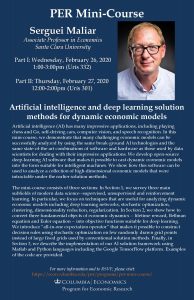
- This event has passed.
PER Mini Course – Serguei Maliar, Associate Professor in Economics, Santa Clara University
Wednesday, February 26, 2020 - Thursday, February 27, 2020
Event Navigation
 Artificial intelligence and deep learning solution methods for dynamic economic models
Artificial intelligence and deep learning solution methods for dynamic economic models
Venue:
This Program for Economic Research (PER)’s Spring Mini Course will be held in two parts.
Part I: Wednesday, February 26, 2020, 1:00-3:00pm (Uris 332) (get directions)
Part II: Thursday, February 27, 2020, 12:00-2:00pm (Uris 301) (get directions)
*Open to current Columbia University students only
Speaker:
Serguei Maliar, Associate Professor in Economics, Santa Clara University
Artificial intelligence (AI) has many impressive applications, including playing chess and Go, self-driving cars, computer vision, and speech recognition. In this mini-course, we demonstrate that many challenging economic models can be successfully analyzed by using the same break-ground AI technologies and the same state-of-the-art combinations of software and hardware as those used by data scientists for dealing with their impressive applications. We develop open-source deep-learning AI software that makes it possible to cast dynamic economic models into the form suitable for intelligent machines. We show how this software can be used to analyze a collection of high-dimensional economic models that were intractable under the earlier solution methods.
The mini-course consists of three sections: In Section 1, we survey three main subfields of modern data science–supervised, unsupervised and reinforcement learning. In particular, we focus on techniques that are useful for analyzing dynamic economic models including deep learning networks, stochastic optimization, clustering, dimensionality reduction, regularization. In Section 2, we show how to convert three fundamental objects of economic dynamics — lifetime reward, Bellman equation and Euler equation — into objective functions suitable for deep learning. We introduce “all-in-one expectation operator” that makes it possible to construct decision rules using stochastic optimization on few randomly drawn grid points instead of large fixed grids used by conventional solution methods. Finally, in Section 3, we describe the implementation of our AI solution framework using Matlab and Python languages including the Google TensorFlow platform. We show three examples: the stylized consumption-savings problems with borrowing constraint, a version of Krusell and Smith (1998) model with 1000 heterogeneous agents which we solve by constructing decision functions of 2000 state variables and “baby ToTEM” – a version of large-scale ToTEM model of the Bank of Canada for projection and policy analysis. Examples of the code are provided.
Recordings:
Recordings of Professor Maliar’s presentations are now available online:
Wednesday, February 26th Lecture Recording
Thursday, February 27th Lecture Recording
Registration:
The Mini Course is open to all current Columbia University students. Register here.
This conference is sponsored by Columbia University’s Program for Economic Research (PER).
Please direct all questions to econ-per@columbia.edu.
1022 International Affairs Building (IAB)
Mail Code 3308
420 West 118th Street
New York, NY 10027

